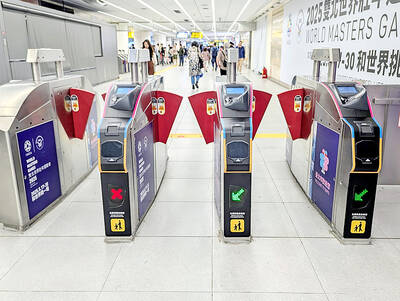Five advocacy groups yesterday called on candidates in the Jan. 11 presidential election to shift the focus of their campaigns to policy issues.
The election is less than a month away, but candidates “have not crossed swords over policy,” Taiwan Youth Association for Democracy managing director Eddy Lin (林彥廷) told a news conference in Taipei.
“The party that is falling behind [in polling] has begun attacks and even a smear campaign,” he said, without naming the party.
On the other hand, the party leading in polls appears to believe that it is “way ahead” and is “completely ignoring policy discussions,” he added.
Lin and representatives of the Awakening Foundation, the Economic Democracy Union, the Youth Labor Union 95 and Citizen of the Earth, Taiwan said that they have identified five areas of concern for the candidates — President Tsai Ing-wen (蔡英文) of the Democratic Progressive Party, Kaohsiung Mayor Han Kuo-yu (韓國瑜) of the Chinese Nationalist Party (KMT) and People First Party Chairman James Soong (宋楚瑜).
The groups hope that the three candidates will start addressing their concerns at the first televised presidential platform presentation being held by the Central Election Commission at 7pm tonight, Lin said.
Regarding young people, Lin said that the policies proposed by the candidates have mostly involved promises of subsidies and benefits.
“Are the candidates able to clearly explain … where the money [to pay for such initiatives] will come from?” Lin asked.
Candidates should not make such promises and then, if elected, “fail to follow through, or follow through, but leave debt for future generations,” he said.
Regarding the nation’s sovereignty, Economic Democracy Union research fellow Chiang Min-yen (江旻諺) said that all candidates should “promise not to negotiate or sign agreements — such as a peace deal or a mutual military trust mechanism — with China under Beijing’s ‘one China’ principle.”
Regarding the environment, Citizen of the Earth, Taiwan deputy secretary-general Tsai Chung-yueh (蔡中岳) urged the candidates to explain if and how they would implement policies — such as energy or carbon taxes — to regulate carbon emissions.
Regarding childcare, Awakening Foundation senior research fellow Tsen Chao-yuan (曾昭媛) asked the candidates to propose a holistic solution, not just subsidies, to the challenges new parents face.
Paid family care leave and the creation of family-friendly public spaces are some of the ideas advocacy groups have proposed, she said.
On labor rights, Youth Labor Union 95 director Chen Hsiao-wen (陳曉雯) pressed for legislation guaranteeing workers time off for typhoon days.
She also called for education on labor rights to begin at an early age.
If the candidates do not respond to the groups’ concerns, they might consider raising them “in person” at presidential platform presentations or debates scheduled for later dates, Lin said.

A magnitude 6.4 earthquake struck off the coast of Hualien County in eastern Taiwan at 7pm yesterday, the Central Weather Administration (CWA) said. The epicenter of the temblor was at sea, about 69.9km south of Hualien County Hall, at a depth of 30.9km, it said. There were no immediate reports of damage resulting from the quake. The earthquake’s intensity, which gauges the actual effect of a temblor, was highest in Taitung County’s Changbin Township (長濱), where it measured 5 on Taiwan’s seven-tier intensity scale. The quake also measured an intensity of 4 in Hualien, Nantou, Chiayi, Yunlin, Changhua and Miaoli counties, as well as

Credit departments of farmers’ and fishers’ associations blocked a total of more than NT$180 million (US$6.01 million) from being lost to scams last year, National Police Agency (NPA) data showed. The Agricultural Finance Agency (AFA) said last week that staff of farmers’ and fishers’ associations’ credit departments are required to implement fraud prevention measures when they serve clients at the counter. They would ask clients about personal financial management activities whenever they suspect there might be a fraud situation, and would immediately report the incident to local authorities, which would send police officers to the site to help, it said. NPA data showed

ENERGY RESILIENCE: Although Alaska is open for investments, Taiwan is sourcing its gas from the Middle East, and the sea routes carry risks, Ho Cheng-hui said US government officials’ high-profile reception of a Taiwanese representative at the Alaska Sustainable Energy Conference indicated the emergence of an Indo-Pacific energy resilience alliance, an academic said. Presidential Office Secretary-General Pan Men-an (潘孟安) attended the conference in Alaska on Thursday last week at the invitation of the US government. Pan visited oil and gas facilities with senior US officials, including US Secretary of the Interior Doug Burgum, US Secretary of Energy Chris Wright, Alaska Governor Mike Dunleavy and US Senator Daniel Sullivan. Pan attending the conference on behalf of President William Lai (賴清德) shows a significant elevation in diplomatic representation,

The Taipei MRT is to begin accepting mobile payment services in the fall, Taipei Rapid Transit Corp said on Saturday. When the company finishes the installation of new payment units at ticketing gates in October, MRT passengers can use credit cards, Apple Pay, Google Pay and Samsung Pay, the operator said. In addition, the MRT would also provide QR payment codes — which would be compatible with Line Pay, Jkopay, iPass Money, PXPay Plus, EasyWallet, iCash Pay, Taiwan Pay and Taishin Pay — to access the railway system. Currently, passengers can access the Taipei MRT by buying a single-journey token or using EasyCard,